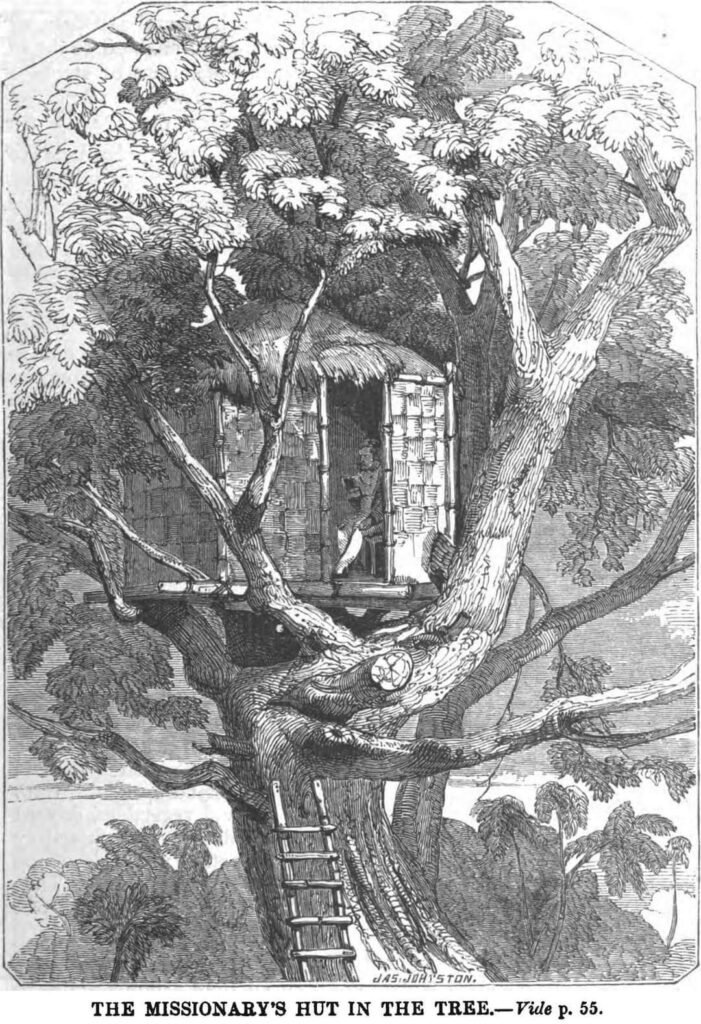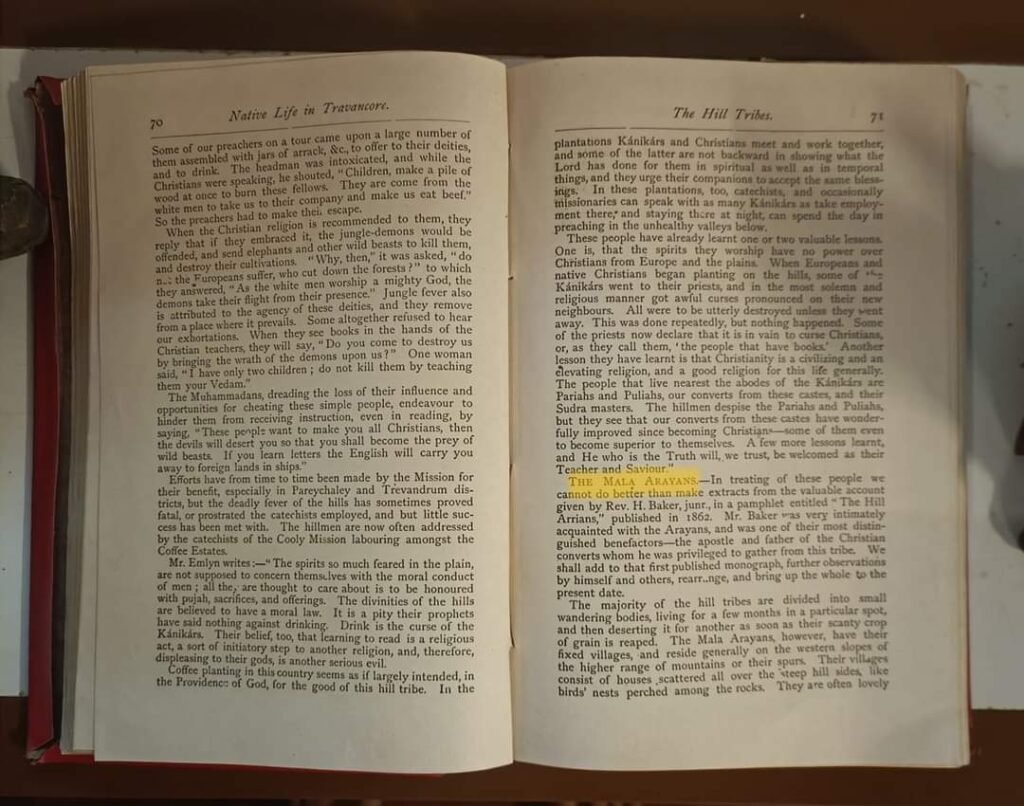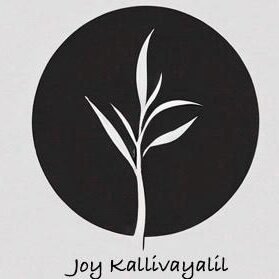തിരുവിതാംകൂറിലെ
മലയരയർ.
കേരളത്തിലെ ആദിവാസി വിഭാഗങ്ങളിൽ സാമൂഹ്യമായും വിദ്യാഭ്യാസപരമായും ഏറ്റവും മുൻപന്തിയിലെത്തിയ സമൂഹം കോട്ടയം ഇടുക്കി ജില്ലകളിലെ മേലുകാവ് തുടങ്ങിയ പ്രദേശങ്ങളിൽ ജീവിക്കുന്ന മലയരയ സമുദായമാണ്. അതിന് കാരണക്കാർ 150 വര്ഷം മുൻപ് മിഷനറി പ്രവർത്തനത്തിനായി എത്തി അവരുടെയിടയിൽ പ്രവർത്തിച്ച ഹെൻറി ബേക്കറും സഹപ്രവർത്തകരുമാണ് . ഇന്ന് സി എസ് ഐ സഭയുടെ ഒരു മെത്രാസന കേന്ദ്രമാണ് മേലുകാവ്. മേലുകാവ് ഹെൻറി ബേക്കർ കോളെജ് മലയരയന്മാർക്ക് മാത്രമല്ല ആ പ്രദേശത്തെ മുഴുവൻ ജനങ്ങൾക്കും ഉന്നത വിദ്യാഭ്യാസത്തിന് അവസരം നൽകിയ സ്ഥാപനമാണ്.
തിരുവിതാംകൂറിലെ വനങ്ങളിൽ താമസിക്കുന്ന മനുഷ്യരെക്കുറിച്ചുള്ള വിശദമായ ഒരു വിവരണം ആദ്യമായി നമുക്കു കിട്ടിയത് സാമുവൽ മറ്റീർ എന്ന വിദേശ മിഷനറി എഴുതി 1883ൽ ലണ്ടനിൽ നിന്ന് പ്രസിദ്ധീകരിച്ച Native Life in Travancore ( മലയാള പരിഭാഷ – ഞാൻ കണ്ട കേരളം) എന്ന പുസ്തകത്തിലൂടെയാണ്.
എന്നാൽ മധ്യ തിരുവിതാംകൂറിലെ മലയരയ വിഭാഗത്തെപ്പറ്റിയുള്ള വിവരങ്ങൾ മലയാളം പരിഭാഷയിലില്ല.
കോട്ടയം ജില്ലയിലെ മേലുകാവിലെ മലയരയജനതയെ സംബന്ധിച്ചും അവരുടെയിടയിൽ പ്രവർത്തിച്ച ഹെൻറി ബേക്കർ ജൂനിയർ എന്ന വിദേശ മിഷനറിയേക്കുറിച്ചുമുള്ള ഒരു വിവരണം 1851ലെ ചർച്ച് മിഷനറി ഗ്ലീനർ എന്ന പ്രസിദ്ധീകരണത്തിൽ കാണുന്നത് അമൂല്യമായ ഒരു ചരിത്രരേഖയാണ്.
മലയരയന്മാർ അദ്ദേഹത്തിന് മരത്തിനു മുകളിൽ നിർമ്മിച്ചു നൽകിയ ഏറുമാടത്തിൻ്റെ രേഖാചിത്രവുമുണ്ട്.
THE HILL ARAANS.(മലയരന്മാർ)
“THE centre of India is much higher than the countries next the
coast: it is what is called a high table-land. You climb up from
the shore by steep valleys and mountains ; and when you have
reached the top you find yourself in a vast plain country, raised, by
the mountains you have ascended, far above the plains below.
In these mountains, called ghauts, which separate the highlands from
the lowlands of India, and on the sides of the still higher mountains
which border India on the north, amidst the jungles and forests,
are to be found very many races of people altogether different from the Hindus.
The attention of our Missionary, the Rev. H. Baker, jun., of Pallam,
in the kingdom of Travancore, has, within these few years,
been drawn to an interesting race inhabiting the forest-clad hills and mountains which are to the east of his Station, at the distance of about forty miles.
They are called the Hill Araans, and live by
cultivation. Mr. Baker describes them as a most interesting people
in manners and appearance, and proverbial throughout the country for their truth, their modesty, and industrious habits. They have well-cultivated fruit and other trees, and a large tract of ground for the growth of rice adjoining each village. They number
about 2000 in a circle of forty miles, their villages being separated
from each other by tracts of thick jungle. Living in villages on
the sides of the ghauts, until visited by our Missionary they never
had an European among them, with the exception of those who
surveyed the country thirty years ago.
About two years ago the Headmen of these people, from five
different hills, applied to Mr. Baker, asking for Schools, religious
instruction, and protection against some persons who oppressed
them. Mr. Baker, thinking they asked for religious teaching only
in the hope of being protected, questioned them on this point, and
in some measure found that such was the case. But when one of
them, the head of thirty-two families, said, ” Sir, we worship our
ancestors, beside other gods : we know nothing aright. Will you
teach us, or not?” and when another said, “The cholera last year,
and the fever this spring, killed all but two of my relations : they died like beasts, and we buried them like dogs. Ought you to neglect us?” he felt he could not do otherwise than promise them all the help he could give. He therefore set out to visit them, accompanied by his brother. They had to walk the whole way, often having to wade across the hill streams, and passing the nights in the houses of the Natives. He found about 500 willing to come under instruction. They said that they wanted no pecuniary help ; that their hill-sides gave them abundance of rice ; and that all they wished was to know how to serve God aright, and that they might .not be obliged to obey other than the proper officers.
Afterward a very encouraging Meeting was held, which Mr. Baker thus describes in one of his Letters, dated May 24, 1849 –
Ten days since we had a grand Meeting of heads of villages: more than 100 men assembled from a dozen different hamlets. Only a few among them who are office-bearers in each hamlet, and who offer to the spirits of their ancestors the cower of all their seed, paddy, &c., wear kudoombies, or top-knots of hair: all others wear it long, like women. They agreed to cut off these top-knots, or have the whole head covered with hair; to learn prayers morning and evening; abolish all practices contrary to Christianity; deliver up to me the signs or symbols of Kali; and have all boys and girls, and themselves, taught. ‘fhey also promised to build a Prayer-house in each place, and requested a Church in a central place; and beg~ed of me to live amongst them. After this I prayed with them, all kneelng in the open air, and, it being night, we had large fires burning. They repeated the Lord’s Prayer, and I blessed them
in the name of our Redeemer and Father, praying the Comforter to
enlighten their soul. All this was fifty miles from home, in the centre of the ghauts, and these men were the heads of families containing 900 and more souls.
Another Letter, dated three months later, contains more information.
About 190 of them have learned the Lord’s Prayer and Belief, and are now getting on with the Ten Commandments. More than 300 are under instruction now; and many other villages of them have asked for Teachers. I am able to spend a week with these people aboat once every month. I consider these mountaineers to be the most promising part of the vineyard entrusted to me.
The villages are situated on the mountain sides ; little terraces being cut out on the steep ascents to prevent wild elephants getting to them. — they are surrounded by dense forest<; of splendid trees, every valley having a little stream falling over granite rocks.
The Headman of one of the villages, who has joined me, is considered very wealthy. His place is called Combukuthie, from the mountain having at a distance, in their idea, the appearance of an elephant fallen with the tusks to the ground. Copara and Magapata are the two other villages.
My Readers and Schoolmasters take it in turn to stay a month each with them ; and, as I have already mentioned, Prayer-houses have been built; the Sunday is kept holy ; the little huts in which lamps to the memory of their ancestors were kept burning have disappeared; prayer, morning and evening, as well as on Sundays, is offered up unitedly; old and young, all capable of learning, are doing so ; and I hope before long I shall have some young men among them capable of teaching others.
The habits, figures, and customs of these Araans are very different
from those of the people we have been accustomed to. Truth· is very rarely departed from. Industry, hospitality, and freedom of speech appear marked in their character. There is no fawning nor cringing about them ; so that even while teaching them, if any thing is told them beyond their understanding or belief, they say so at once. The heathen customs of the women in the lower part of Travancore are not known among them. Since then Mr. Baker has been several times amongst this interesting people. Their god-houses have been pulled down, and the stones which represented the spirits of their ancestors rolled down the hill-side. Last December he remained an entire fortnight with them, during which time he was the inhabitant of a strange habitation-a hut built in a large tree some twenty-five feet from the ground, which we have endeavoured to represent in our Frontispiece.
When our readers remember that tigers and elephants abound in these jungles, they will feel disposed to think that this nest in a tree was, after all, not a bad place to live and sleep in for a time, provided the inmate was careful not to fall out of it. At this place the jungle has been cleared; eight houses for native families built ; a School-room, to be used as a Place of Worship, finished ; while the whole is to be surrounded with a high bank of earth ·and granite stones, with a ditch to keep off the elephants.
In the centre, instead of the house in the tree, there is to be a
bungalow for the Missionary. Meanwhile, until the enclosure is
made, they put him in the most secure place they have. As this
spot is central to the other villages, all the boys are to come there
to School, and several families intend removing to it. Mr. Baker
has got from the owner of the soil a space of two miles round the
spot, which they can cultivate. As the neighbourhood becomes
safe, each house will be built separate in its own garden ; and the
central enclosure will become the Mission Compound, which will
then contain only the bungalow, Church, and School-house.
Let us pray that these poor people may be as a little flock
gathered within the fold of Christ, and safe under His care; so that
the enemy of so~,Jls, who goes about as a roaring lion seeking whom he may devour, may not be able to touch them”.
(digital photo:
1. വന്യമൃഗങ്ങളിൽ നിന്ന് രക്ഷ നേടാനായി മരത്തിനു മുകളിൽ
പുല്ലും മുളയും കൊണ്ടുണ്ടാക്കിയ മിഷനറിയുടെ ഏറുമാടം.
courtesy: gpura.org ).
2. ഇംഗ്ലീഷ് പതിപ്പിലെ വിവരണം
courtsey: ( Rammohan Kt ).


